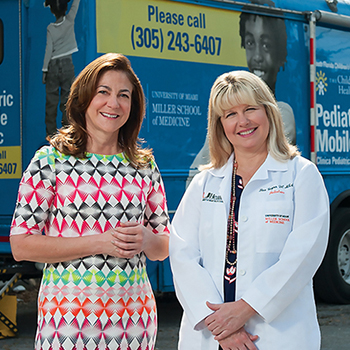Health Rights Clinic won benefits for the underserved
CORAL GABLES, Fla. (October 4, 2016) – When Celiana Acilien and her seven-year-old son Lovedhin Seide risked death at sea traveling to the United States, they didn’t know what to expect, but they knew they were fleeing their homeland of Haiti where Lovedhin was born with several developmental challenges.
 The first several months in the U.S. were tough for the mother and son. Things got a little better once the two found residence at Lotus House, a local shelter.
The first several months in the U.S. were tough for the mother and son. Things got a little better once the two found residence at Lotus House, a local shelter.
Six months after their arrival Lovedhin was referred to the Miami Law Health Rights Clinic. The Health Rights Clinic is a medical-legal partnership operated in collaboration with the University of Miami Miller School of Medicine. Health Rights Clinic law students spend the academic year representing low-income patients with health disabilities referred in by the clinic’s medical partners, many through the Pediatric Mobile Clinic.
The Health Rights Clinic has won over $4 million in benefits for their over 2,000 clients, all from underserved communities, since its inception in 2005. Over 260 law students have contributed more than 65,000 hours in free legal aid. The benefits – from Medicaid to social security – have allowed immigrants, veterans, and uninsured poor children to receive life-saving treatments and helped families to move out of homeless shelters.
This summer, the clinic secured food stamps, cash benefits, and Medicaid for Celiana and Lovedhin; still pending are the asylum applications and Celiana’s work authorization application. Even waiting on those two things, life has improved considerably for the young boy and his mother. They are now in a position to move out of the homeless shelter into a place of their own, and once the work authorization is finalized, Celiana will be able to work to support them.
The clinic’s lawyers and students have also sued the Social Security Administration for extremely long wait times in Miami – the longest in the United States – in securing administrative hearings. Wait times average over 20 months, compared to a national average of 13 months.
“The work of the clinic, through the unflagging efforts of the students has proved to have a tremendous and lasting impact on South Florida’s often voiceless communities,” said JoNel Newman, the clinic’s director. “Dozens of our graduates have gone on to local, national, and international careers advocating for these same populations through public service careers and pro bono work at their private firms.”
The University of Miami’s mission is to educate and nurture students, to create knowledge, and to provide service to our community and beyond. Committed to excellence and proud of the diversity of our University family, we strive to develop future leaders of our nation and the world. www.miami.edu
The University of Miami School of Law’s mission is to foster the intellectual discipline, creativity, and critical skills that will prepare its graduates for the highest standards of professional competence in the practice of law in a global environment subject to continual ― and not always predictable ― transformation; to cultivate a broad range of legal and interdisciplinary scholarship that, working at the cutting edge of its field, enhances the development of law and legal doctrine, and deepens society’s understanding of law and its role in society; and to fulfill the legal profession’s historic duty to promote the interests of justice. www.law.miami.edu
CONTACT: Catharine Skipp at 305-773-5801 or cskipp@law.miami.edu

